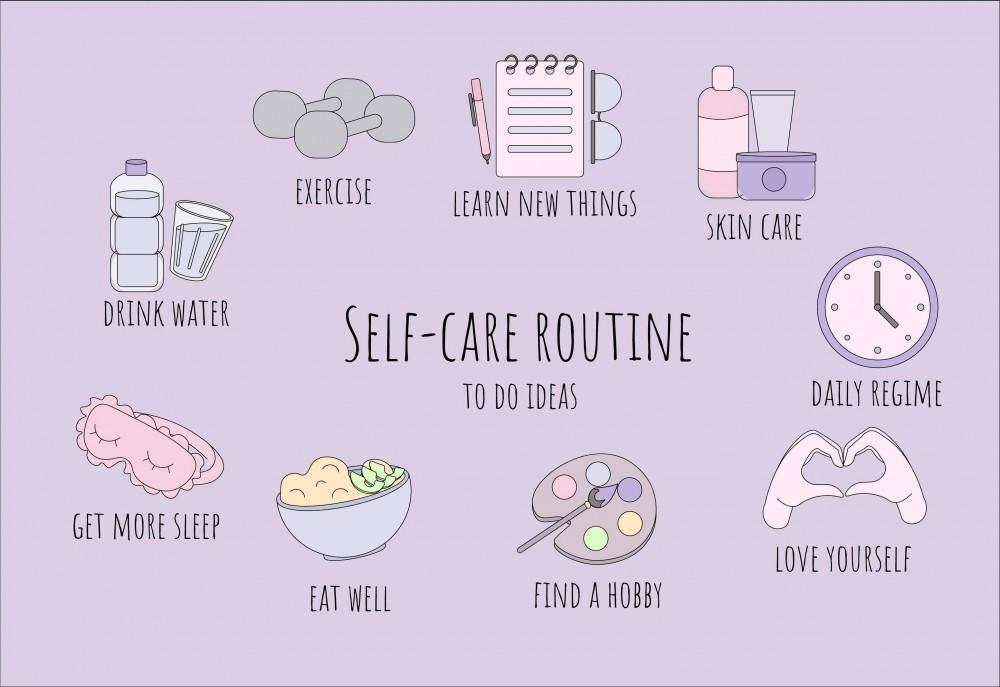Embark on a journey into the realm of self-care lifestyle routines that actually work. Discover the keys to maintaining a healthy balance in your daily life through effective practices and strategies.
Delve deeper into the various aspects of self-care, from physical well-being to emotional resilience, and explore how incorporating these routines can lead to a happier, more fulfilling life.
Overview of Self-care Lifestyle Routines

Self-care lifestyle routines refer to the intentional actions and practices individuals engage in to promote their physical, mental, and emotional well-being. These routines encompass a wide range of activities, from exercise and healthy eating to mindfulness and relaxation techniques.
Incorporating self-care routines into daily life is essential for maintaining overall health and reducing stress. By prioritizing self-care, individuals can better manage their emotions, improve their relationships, and enhance their quality of life.
Importance of Self-care Routines
Consistent self-care practices play a crucial role in promoting holistic well-being and preventing burnout. By taking the time to care for oneself, individuals can recharge, rejuvenate, and build resilience to navigate life's challenges effectively.
- Enhances mental health by reducing anxiety and depression symptoms.
- Boosts physical health through regular exercise, adequate sleep, and nutritious eating habits.
- Improves emotional well-being by fostering self-compassion and self-awareness.
Benefits of Maintaining Self-care Practices
Engaging in self-care routines on a regular basis offers numerous benefits that positively impact various aspects of an individual's life.
- Increased productivity and focus in daily tasks.
- Enhanced creativity and problem-solving abilities.
- Improved relationships with oneself and others.
Physical Self-care Routines
Maintaining a healthy physical self-care routine is crucial for overall well-being. Engaging in activities that promote physical health not only improves fitness but also has positive effects on mental and emotional health.
Effective Physical Self-care Activities
- Exercise: Regular physical activity, whether it's cardio, strength training, or flexibility exercises, helps improve cardiovascular health, boost mood, and increase energy levels.
- Yoga: Practicing yoga can enhance flexibility, reduce stress, and promote relaxation through breathing techniques and mindful movements.
- Dance: Dancing is a fun way to stay active, improve coordination, and release endorphins, which are known to elevate mood.
Impact of Nutrition and Hydration
Nutrition and hydration play a significant role in physical well-being. Consuming a balanced diet rich in fruits, vegetables, lean proteins, and whole grains provides essential nutrients to support overall health. Staying hydrated by drinking an adequate amount of water throughout the day helps maintain proper bodily functions and aids in digestion.
Tips for Creating a Personalized Physical Self-care Routine
- Set realistic goals: Start with manageable exercise sessions and gradually increase intensity to avoid burnout.
- Find activities you enjoy: Choose physical activities that you find enjoyable to stay motivated and make self-care a rewarding experience.
- Listen to your body: Pay attention to how your body feels during and after exercise to prevent injuries and adjust your routine accordingly.
- Include rest days: Allow your body time to recover and rest between workouts to prevent fatigue and overtraining.
Emotional Self-care Practices
Emotional self-care is essential for overall well-being, as it involves managing stress, anxiety, and enhancing emotional resilience through various techniques.
Techniques for Managing Stress and Anxiety
- Practice deep breathing exercises to calm the mind and body.
- Engage in regular physical activity to release endorphins and reduce stress.
- Journaling can help express emotions and thoughts, reducing anxiety levels.
- Seek support from friends, family, or a therapist to talk about your feelings and concerns.
Strategies for Enhancing Emotional Resilience and Well-being
- Cultivate a positive mindset by focusing on gratitude and positive affirmations.
- Set boundaries to protect your emotional energy and prioritize self-care activities.
- Practice self-compassion and forgive yourself for past mistakes or shortcomings.
- Engage in activities that bring you joy and fulfillment to boost emotional well-being.
Role of Mindfulness and Meditation in Emotional Self-care
- Practicing mindfulness involves being present in the moment and observing thoughts and emotions without judgment.
- Meditation can help calm the mind, reduce stress, and improve emotional regulation.
- Regular mindfulness and meditation practice can enhance self-awareness and emotional intelligence.
- Integrating mindfulness into daily activities can promote a sense of peace and emotional balance.
Mental Self-care Strategies
Taking care of your mental health is essential for overall well-being
Promoting Mental Clarity and Focus
One effective method for promoting mental clarity and focus is practicing mindfulness meditation. This involves focusing on the present moment and being aware of your thoughts and feelings without judgment. Mindfulness meditation has been shown to reduce stress, improve concentration, and enhance cognitive function.
- Engage in deep breathing exercises to calm the mind and increase focus.
- Practice yoga to improve mental clarity and reduce anxiety.
- Journaling can help organize thoughts and emotions, leading to better mental clarity.
Activities Supporting Cognitive Health and Mindfulness
Engaging in activities that support cognitive health and mindfulness can have a positive impact on mental well-being. These activities promote brain health, improve memory, and enhance focus.
- Regular physical exercise has been linked to improved cognitive function and reduced risk of cognitive decline.
- Reading books or engaging in puzzles and brain games can help keep the mind sharp and improve cognitive abilities.
- Practicing gratitude and positive affirmations can help shift focus from negative thoughts to positive ones, improving overall mental well-being.
Social Self-care Activities

Social connections play a vital role in self-care as they provide support, companionship, and a sense of belonging. Nurturing healthy relationships and setting boundaries are crucial aspects of maintaining mental and emotional well-being.
Importance of Social Connections
Cultivating strong social connections can help reduce feelings of loneliness, boost self-esteem, and improve overall mental health. Engaging in meaningful conversations and spending quality time with friends and loved ones can have a positive impact on our emotional well-being.
Tips for Nurturing Healthy Relationships
- Communicate openly and honestly with your loved ones.
- Listen actively and show empathy towards others.
- Set boundaries to protect your own emotional well-being.
- Make time for social activities that bring you joy and fulfillment.
Incorporating Social Interactions into Daily Self-care Routines
- Schedule regular phone calls or video chats with friends and family members.
- Join a club or group that shares your interests to meet new people and expand your social circle.
- Plan social outings or activities that allow you to connect with others in a meaningful way.
- Practice gratitude by expressing appreciation for the people in your life and the positive impact they have on your well-being.
Spiritual Self-care Practices
Spiritual self-care plays a vital role in achieving holistic well-being by nurturing the connection between mind, body, and spirit. It involves practices that help individuals tap into their inner selves, beliefs, and values, fostering a sense of purpose and peace.
Techniques for Connecting with One's Spirituality
- Start the day with mindfulness meditation to center yourself and set positive intentions for the day ahead.
- Engage in activities that bring you closer to nature, such as hiking, gardening, or simply spending time outdoors.
- Practice gratitude by keeping a journal and reflecting on the things you are thankful for in your life.
- Explore different spiritual practices like yoga, Tai Chi, or prayer to find what resonates with you the most.
Benefits of Incorporating Spiritual Practices into Daily Routines
- Reduced stress and anxiety levels, leading to improved mental and emotional well-being.
- Enhanced sense of purpose and meaning in life, fostering a positive outlook and resilience in the face of challenges.
- Improved self-awareness and personal growth, aiding in the development of a strong sense of identity and values.
- Deepened connections with others as you become more attuned to your own spirituality and values.
Closing Summary

In conclusion, embracing self-care lifestyle routines that actually work can truly transform your well-being. By prioritizing self-care in your daily routine, you are investing in a healthier, happier future for yourself.
FAQs
What are some effective physical self-care activities?
Effective physical self-care activities include exercise, yoga, and dance, which help improve overall well-being and physical health.
How can mindfulness and meditation benefit emotional self-care?
Mindfulness and meditation techniques can reduce stress and anxiety, enhance emotional resilience, and promote a sense of inner peace and well-being.
Why is social connection important in self-care?
Social connections play a vital role in self-care by providing support, reducing feelings of loneliness, and fostering a sense of belonging and community.
What is the significance of spiritual self-care practices?
Spiritual self-care practices help individuals connect with their inner self, find purpose and meaning, and achieve a sense of balance and harmony in life.







